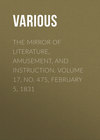Читать книгу: «The Mirror of Literature, Amusement, and Instruction. Volume 17, No. 475, February 5, 1831», страница 6
THE NECROMANCER
BY MRS. HEMANS.
"Shall I make spirits fetch me what I please?
Resolve me of all ambiguities?
Perform what desperate enterprises I will?
I'll have them fly to India for gold,
Ransack the ocean for orient pearl,
And search all corners of the New-found World
For pleasant fruits and princely delicates."
MARLOWE'S Faustus.
An old man on his death-bed lay, an old, yet stately man;
His lip seemed moulded for command, tho' quivering now, and wan;
By fits a wild and wandering fire shot from his troubled eye,
But his pale brow still austerely wore its native mastery.
There were gorgeous things from lands afar, strewn round the mystic room;
From where the orient palm-trees wave, bright gem and dazzling plume:
And vases with rich odour fill'd, that o'er the couch of death
Shed forth, like groves from Indian isles, a spicy summer's breath.
And sculptured forms of olden time, in their strange beauty white,
Stood round the chamber solemnly, robed as in ghostly light;
All passionless and still they stood, and shining through the gloom,
Like watchers of another world, stern angels of the tomb.
'Twas silent as a midnight church, that dim and mystic place,
While shadows cast from many thoughts, o'er-swept the old man's face:
He spoke at last, and low and deep, yet piercing was the tone,
To one that o'er him long had watched, in reverence and alone.
"I leave," he said, "an empire dread, by mount, and shore, and sea,
Wider than Roman Eagle's wing e'er traversed proudly free;
Never did King or Kaiser yet such high dominion boast,
Or Soldan of the sunbeam's clime, girt with a conquering host.
"They hear me, they that dwell far down where the sea-serpent lies,
And they, th' unseen, on Afric's hills, that sport when tempests rise;
And they that rest in central caves, whence fiery streams make way,
My lightest whisper shakes their sleep—they hear me, and obey.
"They come to me with ancient wealth—with crown and cup of gold,
From cities roof'd with ocean-waves, that buried them of old;
They come from Earth's most hidden veins, which man shall never find,
With gems that have the hues of fire deep at their heart enshrined.
"But a mightier power is on me now—it rules my struggling breath;
I have sway'd the rushing elements—but still and strong is Death
I quit my throne, yet leave I not my vassal-spirits free—
Thou hast brave and high aspirings, youth!—my Sceptre is for thee!
Now listen! I will teach thee words whose mastery shall compel
The viewless ones to do thy work, in wave, or blood, or hell!
But never, never mayst thou breathe those words in human ear,
Until thou'rt laid, as I am now, the grave's dark portals near."
His voice in faintness died away—and a sudden flush was seen,
A mantling of the rapid blood o'er the youth's impassion'd mien,
A mantling and a fading swift—a look with sadness fraught—
And that too pass'd—and boldly then rush'd forth the ardent thought.
"Must those high words of sovereignty ne'er sound in human ear?
I have a friend—a noble friend—as life or freedom dear!
Thou offerest me a glorious gift—a proud majestic throne,
But I know the secrets of his heart—and shall I seal mine own?
"And there is one that loves me well, with yet a gentle love—
Oh! is not her full, boundless faith, all power, all wealth above?
Must a deep gulf between the souls—now closely link'd, be set?
Keep, keep the Sceptre!—leave me free, and loved, and trustful yet!"
Then from the old man's haughty lips was heard the sad reply—
"Well hast thou chosen!—I blame thee not—I that unwept must die;
Live, thou beloved, and trustful yet! No more on human head,
Be the sorrows of unworthy gifts from bitter vials shed!"
Blackwood's Magazine.
A MOORE-ISH MELODY
Oh! give me not unmeaning smiles,
Though worldly clouds may fly before them;
But let me see the sweet blue isles
Of radiant eyes when tears wash o'er them.
Though small the fount where they begin,
They form—'tis thought in many a sonnet—
A flood to drown our sense of sin;
But oh! Love's ark still floats upon it.
Then give me tears—oh! hide not one;
The best affections are but flowers,
That faint beneath the fervid sun,
And languish once a day for showers.
Yet peril lurks in every gem—
For tears are worse than swords in slaughter:
And man is still subdued by them,
As humming-birds are shot with water.
Monthly Magazine
THE LAST WORDS OF A MOTH
I burn—I die—I cannot fly—
Too late, and all in vain:
The glow—the light—charmed sense and sight—
Now naught is left but pain.
That wicked flame, no pencil's aim,
No pen can e'er depict on paper;
My waltz embraced that taper waist,
Till I am wasted like a taper.
Worthy the brightest hours of Greece
Was that pure fire, or so I felt it;
Its feeder towered in steadfast peace,
While I believed for me it melted.
No use in heighos! or alacks!
My cure is past the power of money;
Too sure that form of virgin wax
Retained the bee's sting with the honey.
Its eye was blue, its head was cold,
Its round neck white as lilied chalice;
In short, a thing of faultless mould,
Fit for a maiden empress' palace.
So round and round—I knew no better—
I fluttered, nearer to the heat;
Methought I saw an offered letter—
Now I but see my winding-sheet.
Some pearly drops fell, as for grief–
Oh, sad delusion;—ah, poor Moth!
I caused them not; 'twas but a thief
Had got within to wrong us both,
Now I am left quite in the dark,
The light's gone out that caused my pain;
Let my last gaze be on that spark—
Kind breezes, blow it in again.
Then snuff it well, when once rekindled,
Whoe'er about its brilliance lingers,
But though 'twere to one flicker kindled,
Be careful, or you'll burn your fingers.
It sought not me; and though I die,
On such bright cause I'll cast no scandal—
I fled to one who could not fly—
Then blame the Moth, but not the Candle.
Ibid.
THE GATHERER
"A snapper-up of unconsidered trifles."
SHAKSPEARE.
THE LAST FRIEND
A respectable character, after having long figured in the gay world of Paris, was at length compelled to live in an obscure retreat in that city, the victim of severe and unforeseen misfortunes. He was so indigent that he subsisted on an allowance from the parish every week; a quantity of bread was sent to him sufficient for his support; and yet, at length, he demanded more. On this the curate sent for him—he went. "Do you live alone?" said the curate. "With whom, sir," answered the unfortunate man, "is it possible I should live? I am wretched, you see that I am, since I thus solicit charity, and am abandoned by all the world." "But, sir," continued the curate, "if you live alone, why do you ask for more bread than is sufficient for yourself?" The other was quite disconcerted, and at last, with great reluctance, confessed that he had a dog. The curate did not drop the subject; he desired him to observe "that he was only the distributor of the bread that belonged to the poor, and that it was absolutely necessary that he should dispose of his dog." "Ah! Sir," exclaimed the poor man weeping, "and if I lose my dog, who is there then to love me?" The good pastor melting into tears, took his purse, and giving it to him, "Take this, sir," said he, "this is mine; this I can give you."
W.G.C.
ELECTIONEERING PIETY
In the year 1768, the following printed notices were stuck upon the doors and walls of the churches in the City of London, one Sunday morning:—"The prayers of this congregation are earnestly desired for the restoration of liberty, depending on the election of Mr. Wilkes."
J.R.S.
FAZIO
"They have brought out Fazio with great and deserved success at Covent Garden: that's a good sign. I tried during the directory, to have it done at Drury Lane, but was overruled."—Byron's Letters.
THE DEVIL AMONG THE PRINTERS
In the year 1561, a work was printed, entitled the Anatomy of the Mass. It contained one hundred and seventy pages, accompanied with errata of fifteen pages! The author, a monk, in an advertisement prefixed to the errata states, that the devil, to ruin the fruit of his work, employed two very malicious frauds, by first drenching the manuscript in the kennel, reducing it to a most pitiable state, and rendering some parts altogether illegible, and then obliging the printers to commit such numerous blunders, never before equalled in so small a work. To combat this double machination of Satan, he was obliged carefully to reperuse the work, and to form this singular list of the blunders of printers working under the influence of the devil.
W.A.R.
CHARTER
Translation of "a Charter, originally written in Saxon, and granted by William the Conqueror to the Inhabitants of London:"
"William, King, greets William, Bishop, and Godfrey Portgrave" (the same in office as Lord Mayor) "and all the Borough of London, French and English friendly. And I now make known to you, that you are worthy to enjoy all those laws and privileges which you did before the decease of King Edward. And it is my will that every child be his father's heir after his father's decease. And I will not suffer any man to do you wrong. God you keep."
J.H.N.
A "SPECTATOR" NEWSPAPER
"P.S. If you thought of a middle plan between a Spectator and a newspaper, why not?—only not on a Sunday. Not that Sunday is not an excellent day, but it is engaged already. We will call it the 'Tenda Rossa,' the name Tassoni gave an answer of his in a controversy, in allusion to the delicate hint of Timour the Lame, to his enemies, by a 'Tenda' of that colour, before he gave battle. Or we will call it 'Gli,' or 'I Carbonari,' if it so please you—or any other name full of 'pastime and prodigality,' which you may prefer. * * * Let me have an answer. I conclude poetically, with the bellman, 'a merry Christmas to you!"'—Lord Byron to Mr. Moore, in his Life of the Noble Poet, vol. ii. p. 387.
Покупайте книги и получайте бонусы в Литрес, Читай-городе и Буквоеде.
Участвовать в бонусной программе




















